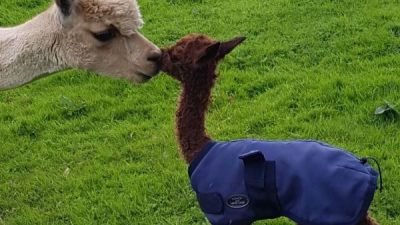Caring for Alpacas in the UK – Health, Feeding, Parasites & More
Learn how to care for alpacas in the UK. This complete guide covers feeding, shelter, parasites, cria care, common diseases, and UK-specific recommendations.
Caring for Alpacas in the UK – Health, Feeding, Parasites & More
Looking after alpacas in the UK is a rewarding experience that combines livestock management with gentle companionship. Whether you're new to alpaca ownership or planning to start your herd, this guide walks you through best practices for keeping alpacas healthy, happy, and thriving.
7 Essentials for Alpaca Care
- Provide a safe and secure environment: Ensure your land has good fencing, dry ground, and basic shelter.
- Feed a balanced diet: Access to hay, grass, occasional minerals, and constant fresh water.
- Monitor their health: Regular checks, weight tracking, and vaccinations are vital.
- Provide regular movement: Even if it’s just field roaming, exercise prevents stress and illness.
- Grooming: Not brushing — but toe trimming, checking teeth, and shearing once a year.
- Observe behaviour: Alpacas rarely show pain, so behavioural changes must be acted on quickly.
- Understand birthing needs: Gestation is ~11.5 months and usually results in one cria born during daylight.
How Many Alpacas Per Acre (UK)
On average, 1 acre supports 6–8 alpacas, depending on soil, grass quality, and climate. Well-drained pasture with rotational grazing improves capacity. Avoid overgrazing to prevent parasite build-up and ensure long-term sustainability.
Alpaca Parasites – Focus on Fluke
What is Fluke?
Fluke is a liver parasite that thrives in wet or muddy environments. It can lead to weight loss, lethargy, diarrhoea, and anaemia in alpacas.
Prevention Tips:
- Rotate pastures and avoid overgrazed wet areas
- Dose alpacas with effective anthelmintics (like Fasinex) as advised
- Use vaccines like Flukiver (spring/autumn)
- Monitor body condition scores regularly
Recommended Medications:
Hensting Alpacas uses both medications as part of a seasonal parasite control plan. Contact Derek Moore for help creating a fluke-prevention protocol for your herd.
Common Alpaca Diseases in the UK
- Foot Rot: Bacterial, caused by wet ground — treat with foot baths and antibiotics
- Coccidiosis: Parasite affecting digestion — monitor for diarrhoea and weight loss
- Pneumonia: Sudden illness in wet/cold conditions — needs urgent antibiotics
- Enterotoxemia: Clostridial disease — prevent via vaccination
- Meningeal Worm: Rare but serious — prevent with monthly ivermectin in risk areas
- Listeriosis: Can occur in silage-fed herds — avoid high-risk feeds
Lactating Females
Lactating alpacas must be monitored for:
- Mastitis: Swollen udder, fever, and reduced feeding — requires vet care
- Overfeeding: Can lead to weight gain and reduced milk quality
- Cria bonding: Ensure cria is suckling effectively and gaining weight
Pasture quality and stress reduction are key. Avoid abrupt changes and handle cria gently during early development.
Weaning Cria at 6 Months
Weaning is stressful and should be handled with care:
- Wean at 5.5–6 months old
- Provide company (e.g., other cria and calm “aunty” female)
- Monitor for stress, dehydration, and food refusal
- Feed quality hay and pellets during weaning
Early weaning (under 5 months) is discouraged unless medically necessary. Watch for signs of behavioural distress.




